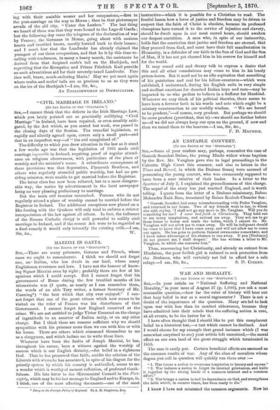MAZZINI IN GAETA.
[TO THE EDITOR OF THE " SPECTATOR.") SIR, —There are many prisoners, German and French, whose cases we ought to commiserate. I think we should not forget one, an • Italian, who has dwelt in our land, whom many Englishmen reverence and love. I have not the honour of know- ing Signor Mazzini even by sight ; probably there are few of his opinions which I could accept. But I cannot forget that his government of Rome during the few troubled months of his triumvirate was (I quote, as nearly as I can remember them, the words of an able Tory writer, a former Secretary of Mr. Canning*) "the best which that city ever enjoyed." I can- not forget that one of the great crimes which now seems to be visited on the ruler of France was his disturbance of that Government. I cannot forget how England connived at the crime. We are not entitled to judge Victor Emanuel on the charge of ingratitude to an assertor of Italian unity, or on any other charge. But I think these are reasons sufficient why we should sympathize with his prisoner more than we can with him or with his house. There are others which commend themselves to me as a clergymen, and which indace me to write these lines.
Whatever have been the faults of Joseph Mazzini, he has, throughout his career, been a witness against the worship of success which is our English divinity,—for belief in a righteous God. That he has preserved that faith, amidst the atheism of the Liberals with whom he has associated, in spite of his disgust for the priestly system by which his country is enthralled, seems to me a wonder which is worthy of earnest reflection, of profound thank- fulness. His late letter to the (Ecumenical Council in the Fort- nightly, which may be his last message to England and to Europe, is, I think, one of the most affecting documents—one of the moat Essay on the Foreign Policy of England By A. if Stapleton, Esq.
instructive—which it is possible for a Christian to read. The fearful lesson how a lover of justice and freedom may be driven to suspect that the faith of Christ is obsolete, because its professed champions have turned it to the service of injustice and slavery, should be dwelt upon in our most sacred hours, should awaken our deepest contrition. A man who, in spite of our insincerity, holds fast the conviction that justice and freedom are eternal, that they proceed from God, and must have their full manifestation in Humanity, is a defender of our faith in the Son of God and the Son of Man, if it has not yet cheered him in his sorrow for himself and for the world.
It may sound cold and dreary talk to express a desire that this and all other consolations may come to him in his lonely prison-hours. But it need not be an idle aspiration that something of his patriotism and zeal for his fellow-creatures—which were exhibited, I understand, during his English exile in very simple and stedfast exertions for deserted Italian boys and men—may be imparted to us who profess to believe in a Sufferer for Mankind. Whatever we may think of his political theories, there seems to have been a fervour both in his words and acts which ought be a salutary counteraction to our worldly wisdom. " We are bound to be prudent,"—of course, very prudent. But perhaps we should be more prudent (provident, that is)—we should see farther before us—if we did not always keep our eyes on the ground, if now and then we raised them to the heavens.—I am, Sir, &c.,
F. D. MAURICE.






























 Previous page
Previous page